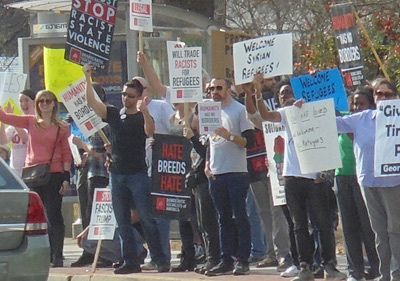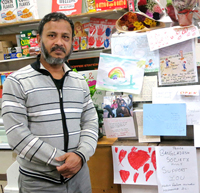
Vol. 79/No. 47 December 28, 2015
(lead article)
Washington’s war moves spark attacks on Muslims
Protests reject assaults on mosques, refugees


inset, Lea Sherman
In a growing number of cases, solidarity actions by working people are rejecting scapegoating of Muslims in atmosphere of U.S. imperialist war drive. Above, some 150 people rally in Stone Mountain, Georgia, Dec. 12 in defense of Syrian refugees. Inset, Sarker Haque, who was beaten in his Fatima Food Mart in Astoria, Queens, shows cards and messages of support he has received.
At the same time, Washington, its imperialist allies and Moscow are increasing their military intervention in the Middle East in the name of combating the reactionary Islamic State. The results for toilers in the region are deadly.
After supporters of Islamic State carried out a Dec. 2 terror attack that left 14 dead in San Bernardino, California, President Barack Obama in a prime-time speech four days later warned that “an extremist ideology has spread within some Muslim communities. This is a real problem that Muslims must confront, without excuse.” He called for prohibiting gun sales to anyone on the government’s secret and arbitrary no-fly list and putting in place “stronger screening for those who come to America without a visa so we can take a hard look at whether they’ve traveled to war zones.”
The next day Republican presidential candidate Donald Trump said he would bar Muslims from entering the U.S. “until our country’s representatives can figure out what is going on.”
In a Dec. 10 television interview on PoliticKING, Rep. Loretta Sanchez, a Democrat running for U.S. Senate in California, said that between 5 and 20 percent of Muslims “have a desire for a caliphate and to institute that in any way possible, and in particular go after what they consider Western norms, our way of life.”
In this atmosphere, more attacks on Muslims and mosques are taking place. “Get the hell out of OUR COUNTRY and go back to the desert,” read a recent anonymous letter to the Al-Tawheed Islamic Center in Jersey City, New Jersey.
“Allah is Satan,” the “Koran is evil,” screamed a woman at Rasheed Albeshari as he was praying in the Lake Chabot Regional Park in Alameda County, California, Dec. 6.
“I can’t wait for the U.S. to get rid of you trash,” a man told a Muslim woman waiting for a bus in Brooklyn Dec. 9. He then kicked her in the thigh. The same day subway workers in the Coney Island yard reported finding graffiti written on a seat that read, “Burn the Muslims, Heil Hitler!”
Actions defend Muslims
There are also more incidents of workers defending Muslims. The counter at the Fatima Food Mart in Astoria, Queens, is now covered in cards and messages of solidarity. Store owner Sarker Haque, originally from Bangladesh, was beaten Dec. 5 by a man who said he would “kill Muslims.” With the aid of two neighbors, the attacker was arrested and charged with assault.Three rallies and a press conference took place in front of the shop over the following week. “I am sickened by the rhetoric of the anti-Muslim campaign,” said Amirtha Kidambi, a musician who lives in the neighborhood, at a Dec. 12 protest there.
In Stone Mountain, Georgia, more than 150 people gathered Dec. 12 opposing harassment of Muslims. “We have to stand in solidarity with those who are under attack,” Justin Christian, a child care worker active in the Fight for $15 an hour, told the Militant.
Several hundred people gathered outside the Trump Tower in New York Dec. 10 to show support for Syrian and Iraqi refugees and condemn attacks on Muslims, including Trump’s statement.
Some 300 protesters marched in Seattle the same day demanding a serious investigation into the death of Hamza Warsame, 16, a Somali-American high school student who fell to his death from a balcony.
In London, 3,000 people protested the British government’s bombing of Syria Dec. 12. “There will be a lot of civilian casualties,” said Retaj Layes, a student of Egyptian and Libyan origin who joined the rally.
War intensifies in Syria, Iraq
Since the Nov. 13 Islamic State assaults that killed 130 people in Paris, Washington has stepped up daily airstrikes of IS positions in Syria and Iraq, with limited help from the French and U.K. governments. The Obama administration is sending to Iraq about 100 special operations forces, in addition to the 3,500 U.S. troops already there, as well as 50 others to Syria. The White House is also considering a Pentagon proposal to further expand its bases from Africa to the Middle East.Since Sept. 30, Moscow has carried out airstrikes in Syria targeting opposition forces to shore up Bashar al-Assad’s brutal regime. A United Nation-brokered deal Dec. 9 led to the withdrawal of hundreds of civilians and opposition fighters from Homs in western Syria. That city was once the center of the uprising against the Assad regime.
Secretary of State John Kerry went to Moscow Dec. 15 to solicit Russian President Vladimir Putin’s assistance in getting a representative of the Assad government to participate in negotiations Washington is brokering for a settlement of the civil war in Syria.
Tensions between Moscow and Ankara heated up after the Turkish military shot down a Russian fighter jet Nov. 24 that it said was in Turkish airspace. The Russian government has imposed economic sanctions against Turkey, and a Russian warship in the Aegean Sea fired warning shots at a Turkish fishing boat that sailed close to it Dec. 13.
The Kurdish People’s Protection Units (YPG) in Syria, which helps lead the Syrian Democratic Forces group, have made progress in recent weeks regaining ground from Islamic State. Washington has carried out some airstrikes to aid the Kurdish advance. But Islamic State continues its deadly assaults. On Dec. 10 Islamic State suicide bombers attacked a hospital, a market and a residential area in the Kurdish-controlled town of Tel Tamer in northeastern Syria, killing at least 50 people.
Lea Sherman in New York, Lisa Potash in Atlanta and Pamela Holmes and Anne Howie in London contributed to this article.
Related articles:
SWP: Working-class campaign against rulers' war policies at home and abroad
Front page (for this issue) | Home | Text-version home